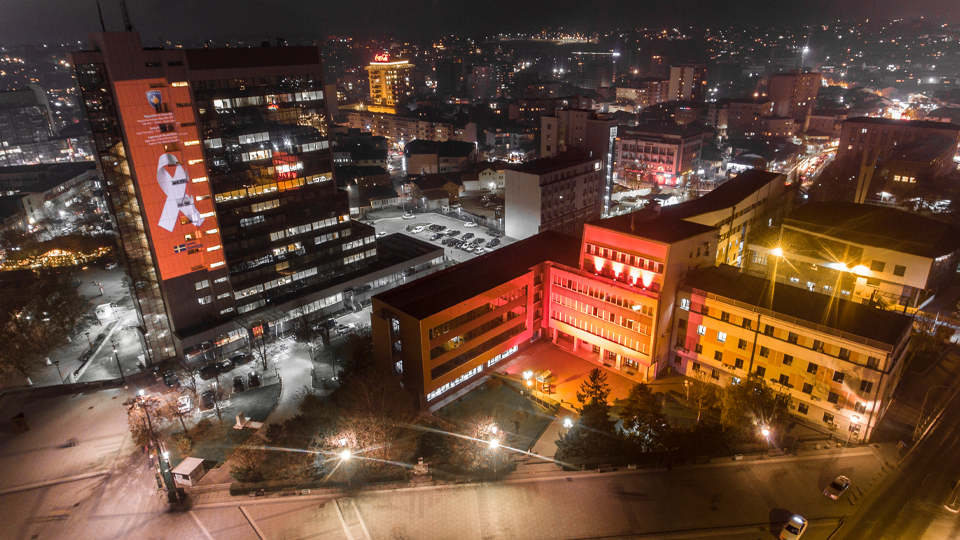Press Release: The 16 Days of Activism against Gender-Based Violence campaign launched in Kosovo on the International Day for the Elimination of Violence against Women
Date:

As the COVID-19 pandemic and a prevailing culture of impunity threatens progress achieved on gender equality and ending violence against women and girls in Kosovo[1] as well as globally, UN Women jointly with the EU Office in Kosovo/EU Special Representative, Tomáš Szunyog, UN Kosovo Team, UN Development Coordinator, Ulrika Richardson, The Head of UN Women Office Vlora Tuzi Nushi, UNDP Resident Representative, Maria Suokko and IOM Chief of Mission, Anna Rostocka, called for robust and decisive action in response to this unprecedented crisis during the launch of the global the 16 Days of Activism against Gender-Based Violence campaign in Gjakova, a city in the south-western part of Kosovo.
25 November marks the International Day for the Elimination of Violence against Women, as well as the beginning of 16 Days of Activism Against Gender-Based Violence, an international campaign that lasts until 10 December, International Human Rights Day. Every year, the campaign calls for global action to raise awareness around the world on preventing and eliminating violence against women and girls, presenting a moment to come together and take action.
Violence against women remains one of the most widespread violations of human rights. Reports showed an alarming increase during past months, in the already existing pandemic of violence against women, especially physical, psychological, sexual and economic forms of domestic violence, fueled by household economic problems and food insecurity as well as confined living conditions. Police reports show nearly 650 cases of domestic violence to have been reported across Kosovo in 2020, which represents a 22per cent increase compared to the same period of 2019. This Kosovo took a big step forward, whereby theAssembly, voted for the direct applicability of the Council of Europe Convention on Preventing and Combating Violence against Women and Domestic Violence, or better known as the “Istanbul Convention” in the Kosovo Constitution. The Convention is a benchmark to combat violence against women, and will strengthen the commitment of Kosovo towards addressing gender-based violence in all its forms, by taking measures to prevent violence against women, protect its victims and prosecute the perpetrators.
This year, to launch the campaign, UN Women, jointly with the European Union Office/ EU Special Representative, UNKT, UNDP and IOM organized a visit to the Gjakova,. The visit started with a meeting with Gjakova Municipality Mayor, Ardian Gjini. It then continued to the “Safe House” shelter for survivors of domestic violence and the bakery owned by the shelter, emphasizing the importance supporting the survivors, especially in the pandemic times, when their economic empowerment and reintegration are at risk. This visit highlighted the support of the European Union and the United Nations to women’s organizations in their work towards the prevention and elimination of violence against women. “Survivors of gender-based violence need to be at the center of the policies. They need to feel that they are not alone. Violence against women affects the whole society, so we all should be involved in eliminating it,”said EU Special Representative Tomáš Szunyog.
"Gender-based violence is one of the most cynic forms of violence, and it happens where women should feel the safest. We should join forces, women and men, local and central level institutions, and civil society organizations to double our efforts towards the elimination all forms of violence against women," stated Ulrika Richardson, UN Development Coordinator in Kosovo.
The activity also included a visit to the business of a woman entrepreneur from the Egyptian Community, organized by IOM. Terzi and Tabak Bridges were turned orange jointly by UNDP and the EU. On this occasion, Tomáš Szunyog, Head of EU Office in Kosovo/EU Special Representative and Maria Suokko, UNDP Resident Representative signed the project agreement on “Cultural Heritage as a Driver for Intercommunity Dialogue and Social Cohesion” which allows for continued cooperation in this area over the next two years where women and youth feature prominently.
The lightning of iconic buildings around the world in orange is a key part of the “16 Days of Activism” campaign, symbolizing a bright future without violence against women and girls. On 25 November, throughout Kosovo, many buildings and cultural heritage monuments were lit up in orange, including the Assembly Building, Ministry of Justice, Cathedral in Pristina, European Union Office Building, the Bill Clinton Street and more.
Kosovo has been part of the global 16 Days of Activism campaign for several years now through the UN Women Office in Kosovo, which co-ordinates the campaign through the multi-stakeholder Security and Gender Group (SGG).
Women and girls in Kosovo, and all over the world, continue facing unimaginable challenges, with COVID-19 deepening existing inequalities, including gender inequality. We are already seeing a reversal of progress on gender equality and women’s rights, which was already fragile before the pandemic hit. This is the time to ensure that gender equality concerns are fully embedded in our short-term responses and longer-term recovery to build the more equal and resilient societiescoming out of this crisis.
[1] All references to Kosovo on this website should be understood to be in the context of the UN Security Council Resolution 1244 (1999).